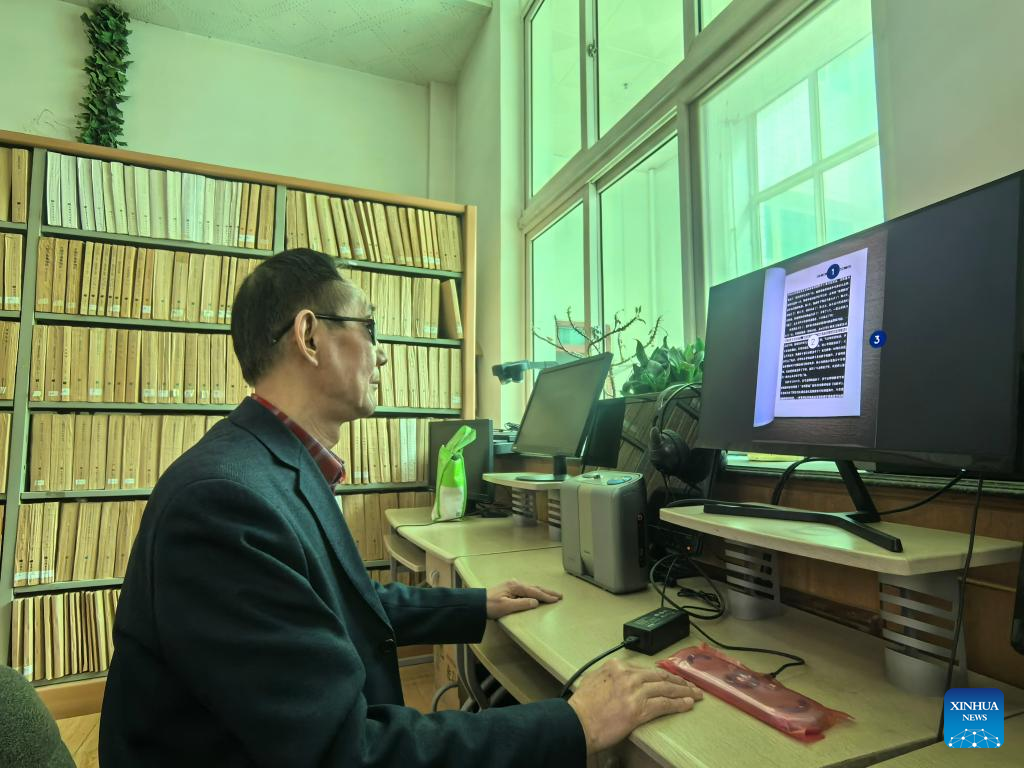Across China: Visually impaired readers find light in books
Source: Xinhua
Editor: huaxia
2025-04-23 17:01:45

Liu Gengsheng reads a book in Braille at a reading room for the visually impaired people in the provincial library in Lanzhou, northwest China's Gansu Province, April 11, 2025. (Xinhua/Ren Yanxin)
LANZHOU, April 23 (Xinhua) -- Almost every weekday morning, an elderly couple walks to a library in Gansu Province, northwest China. Although both are blind, Zhang Shihua, 71, and her husband Liu Gengsheng, 84, have been regular visitors to this world of words for decades.
Guided by staff and volunteers, the couple enters the reading room on the first floor of the library in the city of Lanzhou to join nearly 30 visually impaired readers.
"I love reading. There is always something new in books," Zhang said as her husband sat quietly beside her, passing his fingers lightly over the raised dots on the pages before him.
Wednesday marks World Book and Copyright Day.
According to the China Association of Persons with Visual Disabilities (CAPVD), there are currently over 17 million visually impaired people in China. Despite their visual limitations, they have the same reading needs as those with normal vision.
To protect the reading rights of people with disabilities and meet their cultural needs, the provincial disabled people's federation and the Gansu Provincial Library collaborated to set up a reading room for the visually impaired people in the library in 2010.
The reading room now houses over 8,000 Braille books and more than 6,200 pieces of audio materials in various fields.
Chang Wei, a traditional Chinese medicine physician with 20 years of medical experience, visits the reading room once a week, mainly to read books on literature and medicine.
The 65-year-old lost his sight at the age of 28, but never gave up studying medicine.
"Reading is one way for me to learn and improve," Chang said.
The library also offers its blind community a range of touch screen devices, intelligent book readers and other gadgets all designed with their needs in mind.
"Now, when I want to read a new book, the staff will scan each page into a screen reader. All I need to do is just sit and listen," said Chang.
China has taken various measures to support reading among people with disabilities.
A barrier-free environment law enacted in 2023 encourages offering audio, large-print, Braille, digital and other accessible book formats and inclusive educational materials for people with disabilities and the elderly. In 2021, the country also announced plans to support 50 prefecture-level and 200 county-level libraries to establish Braille reading rooms from 2021 to 2025.
Niu Quanfen, a librarian, observes how reading has reignited passion in many of the library's patrons.
"Some prefer sci-tech books, others humanities or romance novels. Even in their 60s and 70s, they stay surprisingly on trend through audiobooks and social media," she added.
Li Qingzhong, chairman of the CAPVD, noted that severely visually impaired individuals previously relied solely on Braille and large-print materials to stay connected to the world.
"Now, with smartphones and voice-assisted tech like AI dialogue systems, they can read, study, browse short videos, and even run their own social media accounts like other people," he said. ■

Chang Wei, a traditional Chinese medicine physician with 20 years of medical experience, uses an intelligent book reader at a reading room for the visually impaired people in the provincial library in Lanzhou, northwest China's Gansu Province, April 11, 2025. (Xinhua/Ren Yanxin)



